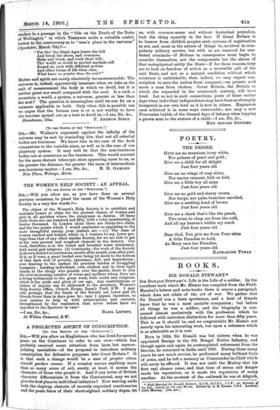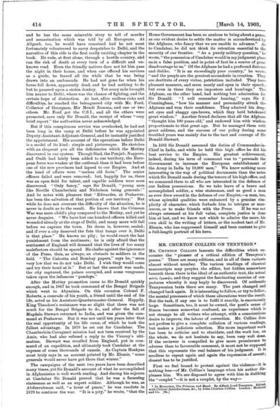BOOKS.
SIR DONALD STEWART.*
SIR DONALD STEWART'S Life is the Life of a soldier. In the excellent book which Mr. Elsmie has compiled from the Field- Marshal's letters and note-books there is scarce a paragraph which does not relate of the art of war. We gather that Sir Donald was a keen sportsman, and a host of friends know that he was a most amiable companion ; but before all things he was soldier, and his biography is con- cerned almost exclusively with the profession which he followed with unbroken distinction for more than fifty years. This is as it should be, and we congratulate Mr. Elsmie not merely upon his interesting work, but upon a reticence which is as admirable as it is rare.
Born in 1824, Sir Donald was but sixteen when he was appointed Ensign in the 9th Bengal Native Infantry, and though again and again he contemplated retirement from the Service, he remained in India until 1885. During those many years he saw much service, he performed many brilliant feats of arms, and he left a memory as Commander-in-Chief which will never be effaced. It was not until the Mutiny that his first real chance came, and that time of stress and danger made his reputation, as it made the reputation of many another. At the moment of the outbreak he was at Aligurh,
• Field-Marshal Sir Donald Stewart, G.C.B.. C.LIL : an Account at his Life, mainly in his own Words. Edited by G. H. Elsraie, C.S.L Londons John Murray. [15e. net. I.
• and he has the same miserable story to tell of murder and assassination which was told by all Europeans. At Alignrh, too, he would have remained had he not most fortunately volunteered to carry despatches to Delhi, and the narrative of this ride is the first really exciting chapter in the book. He rode, at first alone, through a hostile country, tiiid ran the risk of death at every turn of a difficult and un- known road. Even the friendly natives dare not let him pass the night in their house, and when one offered his services as a guide, he feared all the while that he was being drawn into an ambuscade. He had not gone far when his horse fell down, apparently dead, and he had nothing to do but to proceed upon a stolen donkey. Yet every mile brought him nearer to Delhi, where was the chance of fighting, and the certain hope of distinction. At last, after endless risks and difficulties, he reached the beleaguered city with Mr. Ford, Collector of Goorgaon, Mir Mendi Zumma, and one or two others. Mr. Ford got the C.S.I., and all the others were promoted, save only Sir Donald, the receipt of whose "very brief report" the authorities never acknowledged.
But if this conspicuous service was overlooked, he had not been long in the camp at Delhi before he was appointed Deputy-Assistant-Adjutant-General, and he instantly justified the appointment. His account of the operations before Delhi is a model of its kind : simple and picturesque. He sketches with an eloquent pen all the deficiencies which the Mutiny discovered in our system. Though Sind, the Punjab, Nagpore, and Oudh had lately been added to our territory, the Euro- pean force was weaker at the outbreak .than it had been before one of the new provinces had lapsed to our Empire. And at the head of affairs were "useless old fools." The senior officers failed and were removed; but, happily for us, there was an open field for talent, and capable soldiers were soon discovered. "Only fancy," Rays Sir Donald, "young men like Neville Chamberlain and Nicholson being generals ! " And he notes with pleasure that " Edwardes, at Peshawur, has been the salvation of that portion of our territory." But while he does not overrate the difficulty of the situation, he is never in doubt as to the result. He knows that the Crimean War was mere child's play compared to the Mutiny, and yet he never despairs. "We have lost one hundred officers killed and wounded already at the siege of Delhi, and many more will fall before we capture the town. Its doom is, however, sealed; and if ever a city deserved the fate that hangs over it, Delhi is that place." He knows no pity ; he would exact the last punishment from the mutineers; he is only afraid that the sentiment of England will demand that the lives of too many malefactors should be spared He chafes against the ignorance of the Press, then, as always, an obstacle to soldiers in the field. "The Calcutta and Bombay papers," says he, "seem very low that we do not take Delhi. I wish they would come and try their hand at it." But at last the assault was made, the city captured, the palace occupied, and some vengeance taken upon the infamous " pandays."
After the Mutiny promotion came to Sir Donald quickly enough, and in 1867 he took command of the Bengal Brigade which went to Abyssinia. On this occasion Colonel F. Roberts, a comrade of his youth, a friend until the end of his life, acted as his Assistant-Quartermaster-General. Happily, King Theodore's resistance was so slight that there was not much for the Bengal Brigade to do, and after the fall of Magdala Stewart returned to India, and was given the com- mand at Peshawur. But it was not until ten years later that the real opportunity of his life came, of which he took the fullest advantage. In 1878 he set out for Candahar. The Chamberlain-Cavagnari mission had not been received by the Amir, who bad also refused a reply to the Viceroy's ulti- matum. Stewart was recalled from England, put in com- mand of an expedition, and ultimately took Candahar at the expense of some thousands of camels. As Captain Hoskyns most truly says in an account printed by Mr. Elsmie, "some generals would never have got there that winter."
The campaigns of the next two years have been described many times, yet Sir Donald's account of what he accomplished in Afghanistan is well worth reading. And during his sojourn at Candahar Sir Donald proved that he was a farseeing statesman as well as an expert soldier. Although he was, as Abdurrahman said, "a lover of peace," he was resolute in 1879 to continue the war. "it is a pity," he wrote, "that the
Home Government has been so anxious to bring about a peace, as our evident desire to settle the matter is misunderstood by the Afghans, who fancy that we are unable to advance." As to Candahar, he did not think its retention essential to the security of our frontier. "As a purely military question," he wrote, "the possession of Candahar would in my judgment place usin a false position, and in point of fact be a source of great disadvantage to us." Of the Afghans he had a profound distrust and dislike. "It is an exceedingly poor country," he wrote, "and the people are the greatest scoundrels in creation. They are destitute of every virtue, patriotism included. They have pleasant manners, and seem manly and open in their speech; but even in these they are impostors and humbugs." The Afghans, on the other hand, had nothing but admiration for Sir Donald. "1 well remember hearing," says, Sir F. Cunningham, "how his manner and personality struck the Afghans and won their confidence. They admired his deep- set eyes and shaggy eye-brows, which they held betokened great wisdom." Another friend declares that all the Afghans "thought him 100 years old," and endowed him with 'wisdom proportionate to that great age. But be managed them with great address, and the success of our policy during some troubled years was mainly due to the tact and courage of Sir Donald Stewart.
In 1881 Sir Donald assumed the duties of Commander-in- Chief in India, and while he held this high office he did his best service to the Empire. His greatest achievement, indeed, during his term of command was to "persuade the Government to increase the European establishment of the Army in India by 10,000 men." We know nothing more interesting in the way of political documents than the notes which Sir Donald made during the tenure of his high office, and we commend them to all who are interested in the defence of our Indian possessions. So we take leave of a brave and accomplished soldier, a wise statesman, and as good a man as ever drew sword in the defence of our Empire,—a man, too, whose splendid qualities were enhanced by a genuine sim- plicity of character, which forbade him to intrigue or man-
ceuvre, or to make friends with the Press. If he was not always esteemed at his full value, complete justice is done him at last, and we know not which to admire the more, his own skill in the writing of letters, or the modest tact of Mr. Elsmie, who has suppressed himself and been content to give a full-length portrait of his hero.











































 Previous page
Previous page